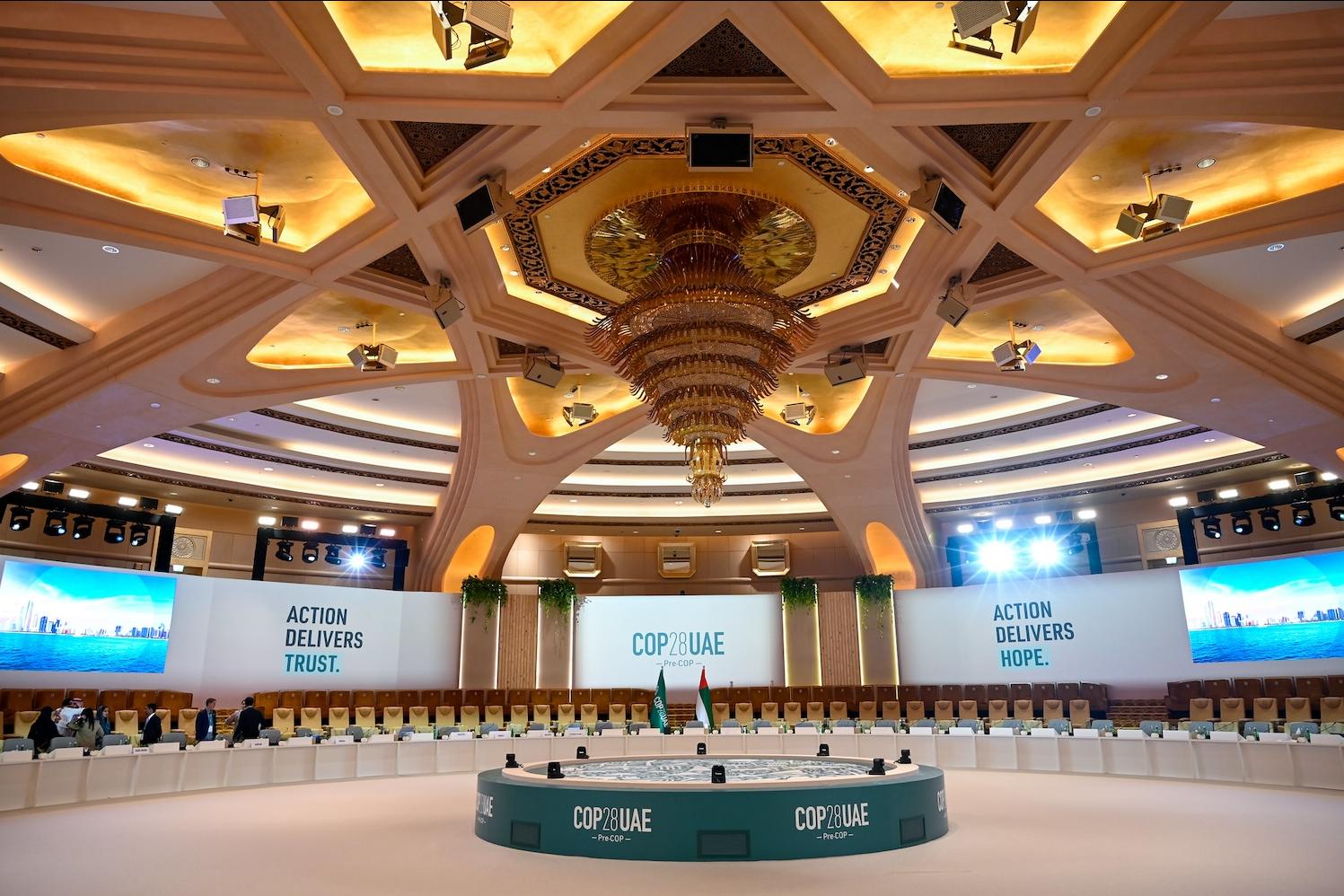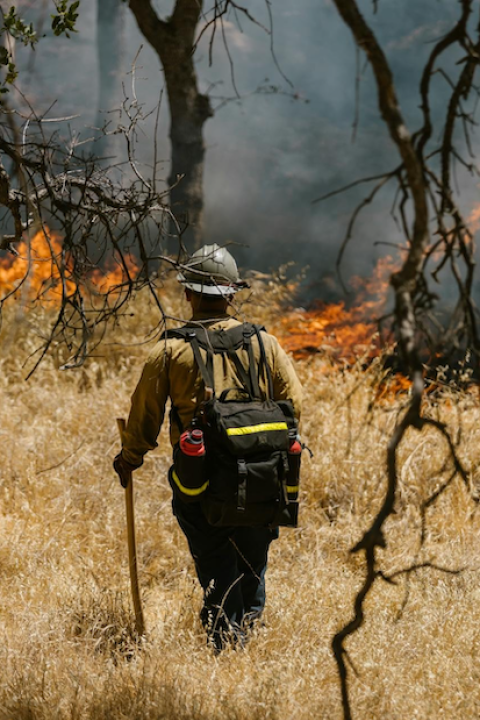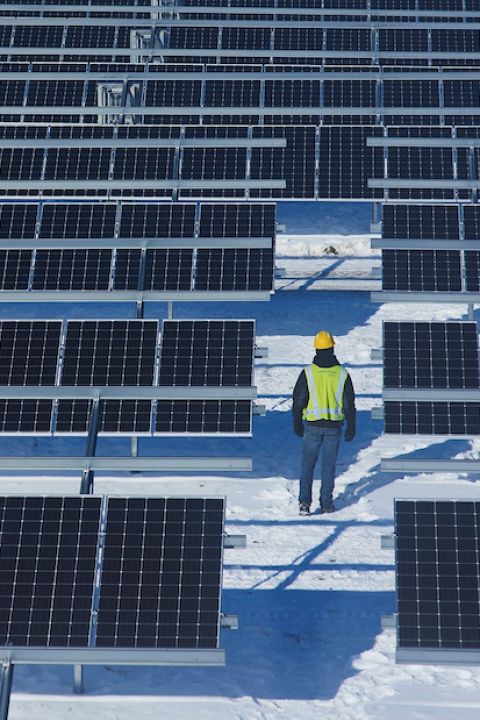
Setup for Pre-COP programming began at the end of October in the United Arab Emirates. (Image: COP28 UAE/Flickr)
Plummeting costs for solar and wind power. Historic government investments in clean energy and climate priorities. A rising tide of corporate leaders eager to help advance solutions and even calling for the phase-out of fossil fuels. These are just a few of the promising signs of progress as representatives begin to arrive in Dubai for COP28, the latest round of global climate negotiations.
And yet, while fresh reasons for optimism abound, we’re still not implementing solutions at the requisite scale or speed to prevent ecological and human catastrophes. The world just endured the hottest summer in 120,000 years, marked by unprecedented wildfires in such far-flung places as Canada and Maui. More recently, the popular tourist destination of Acapulco, Mexico, was devastated by a surprise Category 5 hurricane that spun up in less than 24 hours over unusually warm waters. This is the underlying reality the U.N. reaffirmed when it unveiled the first Global Stocktake report, an essential tool for measuring the world's collective efforts — or lack thereof — against the goals of the Paris Agreement ahead of COP28.
With the stakes continuing to grow and our window of opportunity to avoid the worst effects continuing to shrink, many business leaders want a better understanding of where we stand now, why we continue to fall short of where we need to be, and what we can do to close the gap. In response, I offer two fundamental truths, from which everything else flows.
First, the climate crisis and the nature crisis are inextricably linked and mutually reinforcing. Our warming planet is unraveling ecosystems that sustain all life and undergird all economic activity. And as we lose more of the natural world, we lose critical allies in the fight against climate change. I’m talking about our forests, grasslands and peatlands, and other natural systems that slow warming by absorbing vast amounts of carbon, while also providing key resources that help us adapt to the challenges that a century of human-induced warming has already baked in for life on Earth.
The good news is that companies are waking up to the reality of these twin ecological crises. More than 6,500 companies — including 2,000 small-to-medium enterprises — are setting near-term (e.g. 2030) emissions reduction targets through the Science Based Targets Initiative. Hundreds of others are now setting even more ambitious net-zero targets for 2040 or 2050. And a growing number are taking steps to remove deforestation and other harmful impacts from their product supply chains and even going beyond that to invest in the large-scale conservation and restoration of critical terrestrial, freshwater and marine ecosystems.
Innovation bolsters their efforts. Advances in technology have made wind and solar — which helped the world avert a whopping 600 million tons of carbon emissions in 2022 alone — both affordable and scalable over the last decade, to the point where these so-called “alternative” energy sources are cheaper than gas and coal. Furthermore, research shows that investment in renewables generates three times more jobs than the same investment in the fossil fuel industry. The Clean Energy Buyers’ Alliance, which WWF helped found, reports that more than 70 gigawatts of renewable energy have been contracted by corporations since 2014.
Despite these successes, challenges loom large ahead of COP28. Our current pace in ramping up renewable capacity still lags. We need a two- to three-fold acceleration to achieve our decarbonization goals in time to avoid the worst impacts of climate change. Likewise, nature continues to retreat in the face of expansion for agriculture and development, taking with it the myriad social, economic and cultural benefits that it provides to humanity free of charge.
This brings me to my second truth: The private sector can’t do it alone. We need government action to help create the enabling conditions for change and provide ample financing to support it. Last year’s passage of the Inflation Reduction Act in the United States represented much-needed progress on both of these points. The legislation will direct nearly $369 billion into clean energy and climate-centric initiatives, with the aim of cutting U.S. GHG emissions by 40 percent by 2030.
Government can also establish frameworks for additional climate transparency, a step that 87 percent of Americans support. California’s new Climate Corporate Data Accountability Act, a potential new climate disclosure rule from the U.S. Securities and Exchange Commission, the EU directive on sustainability, and the U.K. directive on climate transition planning are indicative of this expanding frontier. Meanwhile, initiatives like the Taskforce on Nature-Related Financial Disclosures (TNFD) are helping to set a new benchmark for voluntary disclosure on nature impacts.
Business leaders should encourage more government action like this, in the U.S. and on the world stage. The recent and relatively rapid progress toward a global plastics treaty is proof that companies can leverage their collective clout to drive concerted action among the governments of the world. At COP28, and in the months and years that follow it, companies will have another opportunity to push for similar coordination around our global goals for climate and nature.
The Global Stocktake at COP28 once again underscores the need for nations to ramp up their ambitions and match their words with concrete action. It also serves as a reminder that the corporate world has both a stake in and a significant role to play in mitigating climate change and nature loss.
Companies possess the tools, insights and means to drive change. It's about weaving sustainability into the corporate DNA — benefiting the bottom line, uplifting communities, and ensuring a clean, safe and stable future for our planet. The onus now lies with corporate leaders to amplify their efforts, collaborate efficiently and push for a world where sustainable business is simply business as usual.
TriplePundit will be in Dubai reporting from COP28. Sign up for our daily newsletter to follow along with our coverage.

Sheila Bonini leads the private sector engagement team at WWF, overseeing a team of sustainability professionals supporting the organization’s conservation mission














